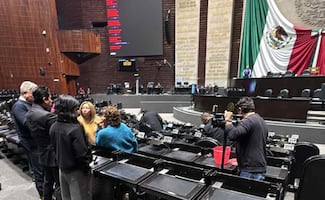Más Información

"Cuba es un paciente desfalleciente"; Ricardo Pascoe examina en Con los de Casa el impacto regional de Trump

Goteras interrumpen sesión en la Cámara de Diputados; ponen cubetas para proteger curules y micrófonos

México no ha sido convocado al Consejo de Paz de Trump; Alicia Bárcena reafirma apuesta por organismos multilaterales

Caso Axe Ceremonia: Familia de Miguel Ángel Rojas coloca contador frente a Juzgado; llevará recuento de días que el proceso lleva detenido

Hermanos Farías, ligados al huachicol fiscal, siguieron cobrando en la Marina pese a proceso penal; uno busca amparo para no perder su salario

Detienen a sujeto que ingresó con vehículo a zona protegida del Nevado de Toluca; es puesto a disposición de la FGR
In the Optics Laboratory of the Faculty of Mathematical Physics Sciences (FCFM) under the Meritorious Autonomous University of Puebla (BUAP) a team of experts started a project to build microscopes out of recycled materials.
The researcher Alberto Cordero Dávila and his students managed to make a microscope with a smartphone camera, a piece of wood, and an acrylic polymer, all of which represented an expense of no more than MXN$100 (USD$5.25), standing in contrast with the average cost of a microscope (around MXN$8,000).
Through a statement, Cordero Dávila said that the university would seek to expand the project so that other institutions may also benefit from the innovation.
Through workshops, the physics expert began training high school teachers to create their own microscopes and replicate said knowledge among their students.
The university has offered three workshops so far: Two at technical secondary schools in the Atlixco municipality, with the support of Mexico’s Ministry of Public Education (SEP), and another at the FCFM Optics Laboratory, attended by more than 30 local teachers who specialize in physics, chemistry, biology, and mathematics at schools affiliated to the College of the State of Puebla (COBAEP).
Cordero Dávila said that the workshops begin at 10 o'clock in the morning and teachers from Tlatlauquitepec, San Martin Texmelucan, Chachapa, Izúcar de Matamoros, and Puebla meet with him and his students to learn how to build and operate the microscope made out of recycled materials.
In work tables, four, five and up to six teachers review their materials: A wooden rectangle of no more than 15 centimeters long, an acrylic plate of the same size, a cell phone with a camera, clips, screws, and a reflective film are some of the tools needed to access a tiny world.
Jair Meneses Mijares, a student of Applied Physics at the BUAP, explained that the idea of creating a microscope out of a cell phone camera emerged a year ago in Alberto Cordero's class.
The microscope is added to other successful initiatives from the university, such as the Del Aula al Universo program, which has equipped more than 600 schools in several states of the Mexican Republic with telescopes and trained more than 5 thousand astronomy lovers.
The researcher Alberto Cordero Dávila and his students managed to make a microscope with a smartphone camera, a piece of wood, and an acrylic polymer, all of which represented an expense of no more than MXN$100 (USD$5.25), standing in contrast with the average cost of a microscope (around MXN$8,000).
Through a statement, Cordero Dávila said that the university would seek to expand the project so that other institutions may also benefit from the innovation.
Through workshops, the physics expert began training high school teachers to create their own microscopes and replicate said knowledge among their students.
The university has offered three workshops so far: Two at technical secondary schools in the Atlixco municipality, with the support of Mexico’s Ministry of Public Education (SEP), and another at the FCFM Optics Laboratory, attended by more than 30 local teachers who specialize in physics, chemistry, biology, and mathematics at schools affiliated to the College of the State of Puebla (COBAEP).
Cordero Dávila said that the workshops begin at 10 o'clock in the morning and teachers from Tlatlauquitepec, San Martin Texmelucan, Chachapa, Izúcar de Matamoros, and Puebla meet with him and his students to learn how to build and operate the microscope made out of recycled materials.
In work tables, four, five and up to six teachers review their materials: A wooden rectangle of no more than 15 centimeters long, an acrylic plate of the same size, a cell phone with a camera, clips, screws, and a reflective film are some of the tools needed to access a tiny world.
Jair Meneses Mijares, a student of Applied Physics at the BUAP, explained that the idea of creating a microscope out of a cell phone camera emerged a year ago in Alberto Cordero's class.
The microscope is added to other successful initiatives from the university, such as the Del Aula al Universo program, which has equipped more than 600 schools in several states of the Mexican Republic with telescopes and trained more than 5 thousand astronomy lovers.
dm
Noticias según tus intereses
[Publicidad]
[Publicidad]









